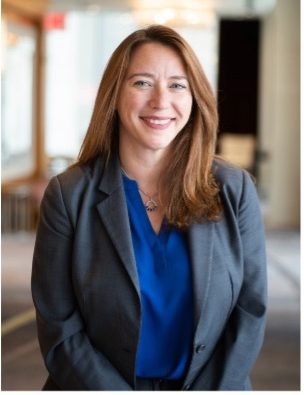Interview with Sherry Madera, Senior Vice President Public Policy & Government Affairs at Mastercard
Sherry Madera joined Mastercard’s global public policy and government affairs team as Senior Vice President in 2022. She oversees the company’s public policy and government affairs activities in Europe, the Middle East and Africa, Central Asia and China.
In this interview, she shares with us how Mastercard is actively contributing to the global challenges of sustainable development, and other insights on sustainability.
Despite today’s geopolitical, economic and security concerns, climate change remains one of the biggest challenges of our generation. Europe has led the way in the fight against climate change. How can the payments industry contribute to meeting the challenges of sustainable development?
The payments industry is very competitive and innovative, particularly in Europe. The past years have seen tremendous change in the way people shop and pay. The industry has kept up and even pre-empted some of these changes and consumer expectations. During the pandemic, when online commerce was at times the only commerce possible, payments worked well and met people’s expectations.
Today, sustainability and environmental concerns are front and centre, giving rise to the “Conscious Consumer” looking to include carbon and sustainability data in their purchasing decisions. The payments industry is in a unique position to contribute to society’s sustainability efforts. Payment actors have access to significant insights into consumption patterns and with that, the ability to analyse consumption trends. For instance, in cooperation with Swedish fintech Doconomy, Mastercard has developed and is offering the carbon calculator which allows people to better understand the carbon footprint of their purchases. That allows them to take actions. This is a journey and we believe in the future offering the conscious consumer more sustainability data will help make bottom-up change in purchases. This solution is constantly evolving and I’m sure that new and exciting solutions are on their way.
How does Mastercard look at ESG overall? What social impact is Mastercard aiming to make?
Mastercard has been a leader on the front lines of financial inclusion, inclusive growth and data responsibility for more than a decade. We believe in doing well by doing good, so that everything we do enables people and the planet to thrive.
Mastercard has been transforming how people pay and get paid for more than 50 years. Our technology enables global commerce to thrive and keeps the world economy running. By advancing efforts to bring 1 billion people into the digital economy, we work to achieve a more inclusive financial system.
Our core behaviors of operating ethically, responsibly and with decency are linked to ESG, making it a vital component of our culture and our future. ESG drives financial value aligned with our business goals. It can help mitigate risks, and is key to our goal of building a more inclusive and sustainable digital economy. This is at the heart of Doing Well by Doing Good.
With technology evolving at a rapid pace — and global crises exacerbating inequalities and economic uncertainty — we are applying our capacity for innovation and our global network of partners to create positive social impact. Our innovation platform, Foundry, helps us to accelerate business growth as well as to enhance the lives of the customers, consumers and communities we serve by experimenting with, co-creating and de-risking new technologies. Building on our track record of impact-focused innovation, including our Financial Inclusion Lab, we launched a new Sustainability Innovation Lab that’s focused on co-creating the next generation of sustainable commerce solutions.
We also take seriously our contribution to thought leadership and policy development in sustainability and sustainable finance. Europe is a global leader in policy initiatives and frameworks including the EU Taxonomy and the implementation through regulation of the European Green Deal. However, other global jurisdictions are also making great strides in setting rules, frameworks, definitions, regulations, law and policy in this area. As a global business, Mastercard works closely with policymakers to offer our views and suggested pathways to using data for all types of financial transactions to allocate capital to a sustainable future.
Can you tell us a bit about Mastercard’s approach to sustainability? How Mastercard can play a crucial role in the transition to net zero?
Mastercard’s continuing commitment to building a more environmentally sustainable approach to growth calls first for reducing the impact of our own operations. This means accelerating active steps to reduce our carbon emissions and working with our suppliers to make similar commitments. But our impact can be even more substantial when we engage our global network of customers and partners to drive collective climate action.
Starting with addressing the impact of our own operations, let me clarify that compared to other industry sectors, we do not have a huge carbon footprint. We do not run factories or manufacture complex physical products that require an intensive use of energy. Having said that, we recently moved up the target date of our commitment to reach net-zero emissions by a decade, from 2050 to 2040. We launched initiatives to help us meet that goal, including formally linking executive and employee compensation to carbon neutrality so our (leadership) teams are held accountable for these commitments; increasing outreach to our supply chain to encourage and assist them in setting their own net-zero targets; tying corporate debt financing to green initiatives; and continuing employee engagement in helping to achieve goals like waste management and recycling.
Going beyond our own impact, we are continuing to build capabilities to meet growing consumer demands for sustainability-oriented products and solutions, such as the Priceless Planet Coalition and the Carbon Calculator which I mentioned a little earlier. These programs are intended to galvanize our network of issuers, banks, retailers, merchants and cardholders to prioritize environmental conservation.
In addition, as people’s passion for the environment grows, we also offer ways for people to contribute to environmental causes. The Wildlife Impact Card program is available to issuers globally and offers consumers who are passionate about the environment and nature a way to help protect wildlife and its habitats. This program highlights the urgency for action with its cards that carry expiration dates reflecting the projected extinction of many critically endangered species.
Finally, the products that we offer are also increasingly made from sustainable resources. From 2018 to the end of 2021, there were 60 million Mastercard-branded cards produced with approved sustainable materials using Mastercard’s Sustainable Card Materials Directory. That’s up from 10.7 million at the end of 2020.As we approach COP27 in November, the commitments of countries, companies and organsiations to Net Zero will require increasing specificity on how we can collectively achieve them. Mastercard’s business and employees are prepared to contribute to these targets as a committed partner operating globally.

“We are continuing to build capabilities to meet growing consumer demands for sustainability-oriented products and solutions, such as the Priceless Planet Coalition and the Carbon Calculator. These programs are intended to galvanize our network of issuers, banks, retailers, merchants and cardholders to prioritize environmental conservation.”
How is Mastercard engaging its customers and clients in sustainability?
We look at engaging them in the same way we engage with our partners on any other activities. Most of them are asking for sustainable solutions and ways to respond to consumer demand, including environmental concerns. So, there is great momentum for activities in this field given the priority that consumers attach to this.
Let me give you one example of how we engage with our partners in general: The Priceless Planet Coalition unites companies, communities and consumers in climate action and now includes more than 100 partners globally, including sustainably minded merchants, fintechs and global banks. Each partner is helping to fund forest restoration through consumer engagement and donation campaigns that encourage people to take climate-friendly actions or make direct contributions through a donation platform. The Priceless Planet Coalition employs a forest restoration model dedicated not only to the planting of 100 million trees but also to the regrowing of forests in geographies that represent the greatest global need. It is a large-scale, high-value conservation opportunity that prioritizes benefits for climate and biodiversity by engaging and directly benefiting local people to promote a sustainable economy. Today, it has 18 restoration projects globally, ensuring we are able to maximize our climate, community and biodiversity commitments. Partners, including customers but also other like-minded companies are regularly joining this coalition.
In your opinion, what are the biggest challenges that the payments industry will face in the coming years? What goals have you set to achieve them?
As I mentioned before, the payments industry is very competitive and changing fast. There is a great variety of players across Europe, many of them nimble and agile. At the same time, technology evolves quickly and so do consumer expectations. One of the greatest challenges for the industry and individual players is to keep up with these expectations and provide products, services and solutions that meet these expectations. This includes sustainability solutions using ESG inputs.
An interesting area for the future is considering how proposed carbon border taxes or adjustment mechanisms will roll out into practice. For the payments industry this will require an understanding of the information needed to do our part to balance cross border commerce with upholding best practice in production and carbon emissions.
At Mastercard we are always thinking about how we continue to serve the needs of our users while conserving planet’s limited resources without leaving anyone behind. Our experience of doing well by doing good positions us well to address this particular challenge. Our goal of bringing 1 billion people into the formal economy and planting 100 million trees are two of the goals that we have set for ourselves directly targets this.
Authors

Sherry Madera
Senior Vice President Public Policy & Government Affairs at MASTERCARD
Search posts by topic
Advisory (6)
Alternative Investment (23)
Alternative investments (2)
AML (1)
Art (1)
Asset Management (24)
Banking (16)
Compliance (1)
Crypto-assets (3)
Digital banking (6)
Diversity (6)
EU (6)
Family Businesses (3)
Family Offices (2)
Fintech (10)
Fund distribution (20)
Governance (8)
HR (8)
ICT (1)
Independent Director (5)
Insurance (1)
Internationalization (1)
LATAM (8)
Legal (9)
Private Equity (4)
Reinsurance (1)
Sustainable Finance (23)
Tax (15)
Technology (6)
Transfer Pricing (2)
Trends (16)
Unit-linked life insurance (6)
Wealth Management (11)

